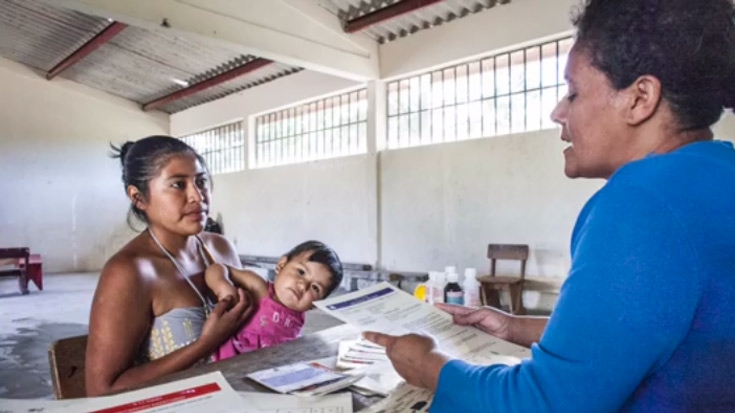Challenge
In 2005, Honduras was one of the poorest countries in Latin America. Despite modest gains in poverty reduction in the 1990s, the prevalence of vulnerability remained high. For many, economic and human development was beyond their reach and the most vulnerable were young children and unemployed youth. These groups were exposed to additional risks that increased their probability of being poor. For young children, the critical risk was chronic malnutrition; for youth 15-19 years of age, the risk was the inadequate level of skills due to incomplete and low quality education.
The Government of Honduras was focused on addressing the challenge of breaking the intergenerational transmission of poverty and accelerating human capital accumulation through integrated social policies targeted to the most vulnerable groups, with complementary social protection interventions, as well as creating a framework for an integrated social protection system.
Solution
The World Bank had been working with the Government to develop analytical and operational building blocks to support public efforts to reduce poverty sustainably. Based on this foundation, the Nutrition and Social Protection Project was designed to improve Honduras’ social safety net for children and youth and reduce the exclusion of vulnerable groups by addressing three related social policy challenges: poverty, malnutrition, and limited opportunities for youth.
The Project helped improve the overall social protection system by developing a legal and policy framework for social protection and a coherent institutional structure to coordinate budget allocations and monitor social protection interventions. It expanded a community nutrition program to the six poorest Departments while piloting a parenting intervention to promote children’s cognitive, socio-emotional, and linguistic development and real-time cell phone monitoring of nutrition indicators. The Project worked closely with the private sector to implement an innovative youth employment program that combined life skills training, technical skills instruction, and internships.
Results
The International Development Association Credit supported the following results:
- Development of a Social Protection Policy that was signed into law.
- Creation of the Secretary of Social Development, mandated to oversee all social protection interventions.
- Establishment of a social protection information system, a beneficiary registry, a social programs registry, and monitoring and evaluation tools. These tools will provide a clear vision for social protection and the means to implement it.
- Delivery of nutrition services to 36,000 children under two years old in 1,038 communities, resulting in a 4.7 percentage point reduction in chronic malnutrition for children were involved in the program for an average of 12 months.
- If children had been involved in the program for the full two years (birth through age two), the reduction would have been 11.5 percentage points using the National Center for Health Statistics (NCHS) growth reference.
- Positive behavioral changes (e.g., exclusive breastfeeding, feeding practices for children 6-24 months, etc.).
- Training of 4,883 at-risk youth, 47% of which are women, and 30% of whom found employment within 6 months of graduation, even a in the challenging context of political crisis and restrictive labor laws for youth. The average salary for beneficiaries was higher than the national average for that age group (15-19 years old).
- Establishment of an employment information service, which now has budget and personnel within the Secretary of Labor.
Bank Group Contribution
The Project provided a total of US$20.9 million, of which US$1.92 million financed social protection, US$12 million financed nutrition, and US$7 million financed youth employment. Additionally, US$1.2 million from the Rapid Social Response (RSR) trust fund was used to further strengthen the nutrition response.
Partners
Consistent with the Paris/Accra harmonization efforts, the Project supported Honduras’ development priorities and promoted harmonization of all stakeholders. Analytical work, policy dialogue and operational support for social protection were coordinated with the Inter-American Development Bank. Through the Project, the Bank was able to leverage US$1.2 million from the Rapid Social Response (RSR) trust fund.
Moving Forward
The Project supported a transition agenda for the new Government, summarizing the country’s achievements in social protection to ensure continuity of human development policies. An ongoing Social Protection (SP) Project (Credit No. IDA 5294-HN; P0115592) will continue to strengthen national capacity to administer social protection programs, particularly the Conditional Cash Transfer program, Bono 10,000. The RSR grant has developed mobile technology for data collection to facilitate evidence-based decision making in nutrition. The youth employment model has been adopted and is being implemented by other development partners in the country through a €40 million project.
Beneficiaries
When asked if mothers follow the recommendations of the community nutrition program, one community worker (monitora) from the Department of La Paz said, “Yes, we had a girl who was about to become malnourished, every month with the same weight. I went to her house, went to visit, talked to the mother about what how to feed her child. I was glad I went, and the mother learned. Now the girl is well.”


